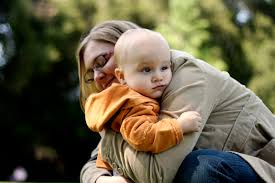A Harvard University study of 24 countries, carried out between the years 2002 and 2012, found daughters of mothers in work have better careers, higher pay and more equal relationships than those of stay-at-home mothers.

The lead researcher said: "Employed mothers often internalize social messages of impending doom for their children, and fathers who choose to emphasize care-giving run up against countervailing social messages signaling their inadequacy as breadwinners."
But data showed that daughters of working mothers were paid 4% more than their peers. They also found one in three daughters of working mothers occupied managerial posts, compared with one in four of those of stay-at-home mothers.
These findings suggest that in addition to transmitting gender attitudes across the generations, daughters learn, from their mothers' employment, a set of skills that enable greater participation in the workforce and in leadership positions.
Sons of working mothers tended to spend more time caring for family members than adult sons of stay-at-home mothers.
The study concluded: "Women across the world have increasingly entered the paid workforce, but the parallel increase in men's contributions to unpaid work within households lags behind. Women's entrenched responsibilities for household work constrain their choices in the public sphere.
"Men also bear costs from the unequal distribution of household responsibilities; gendered practices and norms in public and private spheres act as barriers to men who want to take on bigger roles at home." Source: BBC.
So, having a mother in employment gives long-lasting, positive effects on children. “When you go to work, you are helping your children understand that there are lots of opportunities for them.”
Some of the language is hard to comprehend. It's basically saying that the children take their lead from the roles their parents play. If the mother works, and the father is happy with her role, the rest of the family pitch in to help with household chores like cleaning and cooking. The sons learn how to care for the family unit and the daughters are free to make their own decisions about what to do with their life.

I never worked when my children were young in the 60s and 70s. However, I taught my children to look after their own rooms, keep the living areas tidy, and each of them helped prepare the meal and clean up afterward. You think I'm going to say they turned out perfect? Nope. But my son loved to cook as an adult. And my youngest daughter worked as a top model in the 80s.
What are your experiences?





 RSS Feed
RSS Feed
